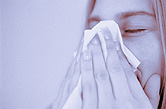
THURSDAY, Nov. 24 (HealthDay News) — The holiday season can be a challenge for people with allergies and asthma, but there are a number of things they can do to protect themselves, allergists say.
Food allergies are an issue because many traditional holiday foods contain such allergens as wheat, soy, dairy and nuts, the experts pointed out in a news release from the American College of Allergy, Asthma and Immunology (ACAAI).
For example, self-basting turkeys can include soy, wheat and dairy. A natural turkey is the safest choice since it contains nothing but turkey and water. Another recommendation: Use wheat-free bread for the stuffing.
To make allergen-free mashed potatoes, use chicken broth and margarine instead of milk and butter. It’s also a good idea to forgo slivered almonds as a topping on the green bean casserole, the ACAAI suggests.
Pumpkin allergies are rare but can cause problems. It’s a good idea to have alternative desserts or to suggest that guests with serious food allergies bring their own desserts.
Visiting or staying at other people’s homes can expose allergy and asthma sufferers to a number of environmental triggers. For example, fancy guest soaps may contain fragrances that can cause allergic contact dermatitis. So you should use regular soap or bring your own.
If your hosts have pets, asking them to confine the critters in the basement won’t do much good. Pet dander gets everywhere and is nearly impossible to eliminate. Your best bet is to use allergy treatments such as antihistamines, nasal sprays and decongestants or appropriate asthma medications, the ACAAI advises.
If you’re hosting someone with allergies or asthma, thoroughly dust the extra bedroom and wash bedding in hot water to eliminate dust mites. If you’re a guest, consider bringing your own pillow or allergen-proof pillow cover.
“A number of holiday-related triggers can make people sneeze, wheeze or, in the case of food allergies, have a more serious reaction,” said Dr. Myron Zitt, past president of the ACAAI, in the news release. “But by planning ahead, the day can go smoothly for people with allergies or asthma.”
More information
The U.S. National Institute of Environmental Health Sciences has more about allergens and irritants.

